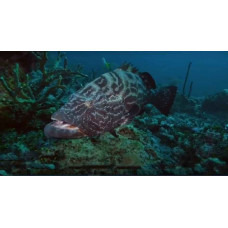Latin name
Mycteroperca bonaci
Other names
Rockfish; Portuguese: badejo-ferro, badejoquadrado; Spanish: bonaci, cuna bonací, cuna guarei.
Identification
Depending on its habitat, the black grouper may be olive, gray, or reddish-brown or black in color. It has black and copper, almost rectangular spots. It can pale or darken until its markings are barely visible. He has a thin pale fringe on the pectoral fins, a broad black edge and a thin white edge on the tail, sometimes a narrow orangish edge on the pectoral fin. The tail tips and soft dorsal and anal fins are bluish or black. The black grouper has a square tail and a smoothly rounded gill cover.
Distribution
Black grouper are found from Bermuda and Massachusetts to southern Brazil, including the southern Gulf of Mexico, occasionally in the Florida Keys, the Bahamas, Cuba, and throughout the Caribbean. Adults are unknown on the northeastern coast of the United States.
Habitat
Black grouper are found far from shore, near rocky and coral reefs, steep walls in water more than 60 feet deep. Usually drifting just above the bottom, juveniles may live in shallow coastal waters, and adults are sometimes found in open water far above the reefs.
Size
Black grouper typically reach 40 pounds, but can grow over 100 pounds. The world record for fishing with all tackle is shared by two 114-pound fish, one from Texas and one from Florida. The average length of a black grouper ranges from 11⁄2 to 3 feet, with a maximum of 4 feet.
Life history and Behavior
Black grouper spawn between May and August. As in many species of grouper, the young start out predominantly female, transforming into males as they grow larger.
Food and feeding habits
Adult black grouper feed mainly on fish, sometimes squid, and juveniles - mainly crustaceans.
Reproduction
No information
| Classification | |
| Phylum | Chordata |
| Class | Actinopterygii |
| Squad | Perciformes |
| Family | Serranidae |
| Genus | Mycteroperca |
| Species | M. bonaci |
| Features | |
| Conservation status | Near Threatened |
| Habitat | Pelagic |
| Life span, years | No information |
| Maximum body weight, kg | 100 |
| Maximum length, cm | 150 |
| Sailing speed, m/s | No information |
| Threat to people | Edible |
| Way of eating | Predator |





